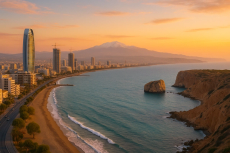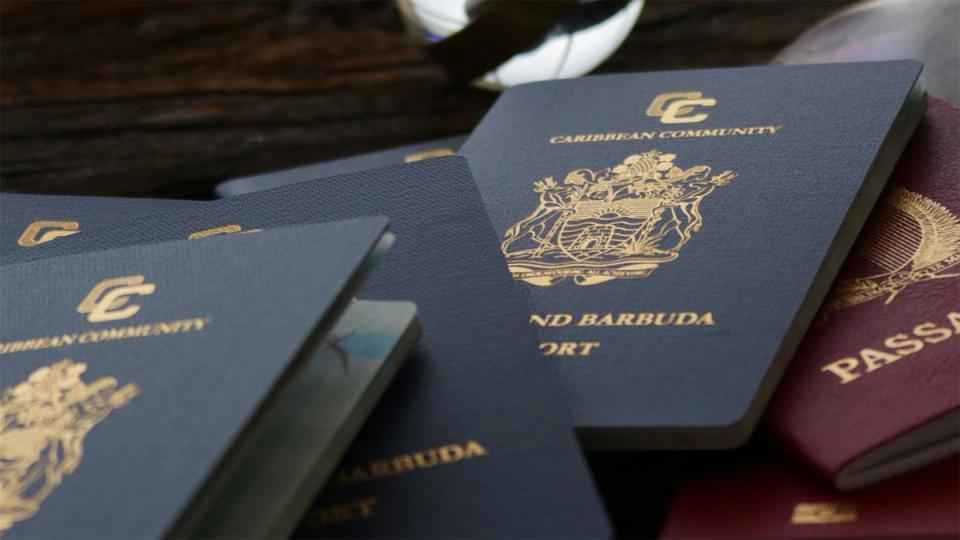Blog • Published on:April 25, 2024 | Updated on:November 26, 2024 • 15 Min
Citizenship By Investment FAQs: Navigate The Process Easily
Citizenship by Investment FAQs provide invaluable guidance for investors seeking to expand their opportunities and enhance their global mobility. In an increasingly interconnected world, Citizenship by Investment has emerged as a strategic avenue for investors to access new horizons of stability and prosperity. By examining the frequently asked questions surrounding citizenship by investment, individuals can gain valuable insights into the process, requirements, and advantages of obtaining a second passport through investment.
Citizenship by Investment FAQs You Must Know
What is Citizenship by Investment?
Citizenship by investment is a procedure whereby individuals can secure citizenship in a nation through financial contributions to the economy, typically directed towards real estate, government bonds, or national development funds.
Which Nations Offer Citizenship by Investment Programs?
A myriad of countries boast their own versions of citizenship by investment programs, including:
- Antigua & Barbuda
- Dominica
- Grenada
- St Kitts & Nevis
- St Lucia
- Malta
- Turkey
- Egypt
- Jordan
- Vanuatu
- Cambodia
Beyond Citizenship, What are the Benefits?
Advantages extend to visa-free travel privileges (heightened global mobility), mitigating political and economic turmoil, potential fiscal benefits through astute investments, eligibility for family inclusion, enhanced wealth management opportunities, and favorable taxation.
Is Dual Citizenship Permissible?
Dual citizenship is allowed by participating countries, but it’s imperative to verify your home country’s stance on dual nationality.
What is the Difference Between Citizenship and Residency by Investment?
Citizenship programs confer immediate nationality and a passport without residency mandates, unlike residency programs, which often lead to citizenship through prolonged domicile.
Citizenship and residency are both legal statuses, but citizenship is perpetual and offers a person all the political rights in a country, whereas residency is conditional and has restrictions on the rights of a person (i.e. work, study, physical residence, etc.)
How can I ensure the legitimacy of the programs I am applying for?
Legitimacy in investment migration was an issue a few decades back, but verifying a Citizenship or Residency by Investment Program’s authenticity or an agent’s certificate is much simpler now, if you know exactly what to look out for.
When considering a Citizenship by Investment Program, always conduct some research to find the official government website. This will tell you what government authority officially runs the program and will provide you with the laws to prove that the program is authentic.
You may see ads for citizenship by investment programs in the United States, the United Kingdom, Singapore, and others. But a quick search will show you that these do not exist and that these countries only offer Residency by Investment Programs or Investment Migration Programs.
Some providers will try to utilise existing media to make a program seem real, like in the case of North Macedonia when service providers started marketing its citizenship by investment program at $200,000. While the government was thinking about launching a program and prepared the law to match it, the program was never officially announced, and those who did apply were left in limbo as their cases were not processed.
What Are the Potential Risks?
Risks encompass policy shifts, economic fluctuations affecting real estate, and changes in global visa policies, highlighting the need for prior due diligence to ensure a program aligns with your objectives and needs.
Citizenship by Investment Eligibility Requirements FAQs
What is the Financial Threshold for Citizenship Acquisition?
The requisite investment ranges from $100,000 to in excess of $1 million USD, varying significantly by country and subject to periodic adjustments.
Is the Investment Refundable?
Investment recuperation depends on the chosen avenue and the investment program; while government contributions are generally non-refundable, real estate investments may be sold after a stipulated duration.
If I Choose to Invest in Real Estate, How Can I Ensure the Correct Valuation of The Chosen Property?
The real estate option is based on an open market policy, allowing investors to choose any property they’d like as long as they meet the minimum investment requirement.
However, that flexibility can breed a major problem – markups. A property in Greece might have a fair market value of €210,000, but a real estate agent may find an evaluator who officially values it at €250,000, so it meets the Golden Visa’s minimum investment requirement.
Once the government has an official valuation, it will proceed with the application, as government officials may not double-check it since the evaluator should be doing his job correctly.
Is There a Cap on Citizenship Grants Annually?
Some nations limit the annual number of citizenships to uphold passport prestige, necessitating a check for potential quotas, but the vast majority do not have a limit.
Can the Investment Be Financed?
The investment typically needs to be from personal funds, with the legality of source imperative, and financing the investment directly is not applicable. However, in some investment programs, such as Turkey’s, a loan is acceptable as long as the property chosen under the program is not used as collateral.
How to Ensure that My Funds Are Qualified?
Now, funds are a popular investment option but they may seem a bit foreign to the average investor, so extra caution is needed when choosing the fund under which to lodge an application for a Golden Visa.
Portugal, for example, has a government entity that regulates investment funds, the Securities Market Commission or CMVM. Any fund registered under and regulated by the CMVM qualifies for the Golden Visa, and there are hundreds of them.
But that isn’t the only criteria a fund must meet to qualify for the Golden Visa, as they need to invest the majority of their funds into something other than residential real estate developments and focus the majority of their funding in Portugal.
Can I Invest in an Off-plan Project to Be Qualified for Citizenship By Investment Programs?
Many citizenship and residency by investment programs allow for investors to qualify through investing in an off-plan project, meaning that the project hasn’t yet started construction, and that is where many of these problems lie.
Off-plan projects can be beneficial but it all hinges on the completion of the construction.
If you do want to invest in an off-plan project, the first thing to look at is the funding. If the developer is funding most of the cost, then they will want to get the job done as soon as possible. If most of it is funded by investors and third-party financing institutes, then the developer may not be in a hurry to finish, as they have no financial risk involved.
Are There Shortcuts to Obtaining Second Citizenship?
Many countries, like Spain, Argentina, and others have expedited routes to naturalisation, while Malta has a full-fledged Citizenship by Investment Program that significantly decreases the time needed to become a citizen.
However, deceptive firms might offer clients a residency by investment program with a fast track to citizenship that does not exist.
Spain has a naturalisation residency requirement of ten years. But for certain nationalities, such as Latin Americans and Filipinos, that time frame is cut down to just two years. A deceitful practitioner might highlight parts of the law and make it seem like it is open to those who invest in the Golden Visa, which is not the case.
Are There Non-Financial Routes to Citizenship?
While rare, some investment programs might consider significant economic contributions, like job creation, as an alternative to direct financial investment.

Citizenship by investment is the process of obtaining citizenship in a country through financial contributions to its economy, usually involving investments in real estate, government bonds, or national development funds.
Citizenship by Investment Application Process FAQs
What is the Typical Duration for Processing?
Depending on the specific nation and application complexities, processing times can fluctuate widely, from a few months to over a year.
Is Residency in the Host Nation a Prerequisite?
Most programs waive residency or travel requirements pre and post-citizenship acquisition; the one exception to this rule is Malta.
What Is Citizenship by Investment Process?
The citizenship by investment process typically unfolds in several structured phases:
1 - Preliminary Assessment and Consultation:
Initially, prospective applicants undergo a preliminary assessment, often facilitated by an authorised agent or legal advisor, to ascertain eligibility. This stage involves understanding the applicant’s objectives, financial capability, and any potential issues that might affect eligibility.
2 - Selection of Investment Option:
Based on the assessment, the applicant selects an appropriate investment program that aligns with the program’s requirements and their personal investment preferences. This could involve choosing between real estate, a national fund donation, government bonds, or other qualified investments.
3 - Documentation and Application Preparation:
The applicant, with assistance from their authorised agent, gathers all necessary documentation. This documentation often includes personal identification, proof of the source of funds, medical records, and police clearance certificates, among others.
4 - Submission of Application and Due Diligence Fees:
The completed application, along with all required documentation and the applicable due diligence and processing fees, is submitted to the relevant government body or authorised unit overseeing the citizenship by investment program.
5 - Government Due Diligence and Background Checks:
The government conducts thorough background checks and due diligence to verify the information provided in the application, assess the legitimacy of the investment funds, and ensure the applicant poses no security or legal risk.
6 - Investment Execution:
Upon successful completion of due diligence and receipt of initial approval, the applicant is required to execute the investment, such as completing the real estate purchase, transferring funds to the national development fund, or fulfilling other investment criteria specified by the program.
7 - Final Approval and Citizenship Grant:
Following the investment confirmation, the government issues final approval to obtain citizenship. The applicant then receives a certificate of naturalisation and can apply for a passport in the new country.
8 - Passport Issuance:
The last step involves the issuance of the passport, marking the culmination of the citizenship by investment process. The new citizen can now enjoy the benefits associated with their new status, including travel freedom, potential tax advantages, and more.
Each citizenship by investment program has its unique nuances, timelines, and requirements, making it essential for applicants to work closely with knowledgeable and accredited professionals throughout the process to ensure compliance and the successful acquisition of new citizenship.
What Due Diligence Measures Are Undertaken?
Rigorous vetting, encompassing financial scrutiny, criminal background checks, and occasionally health examinations, is standard to ensure applicant integrity.
What Happens if the Application Is Denied?
Typically, the investment is reimbursed if contingent on approval, excluding non-refundable processing charges, with terms varying by program.
Does the New Passport Facilitate Visa-Free Entry to Major Countries?
Visa-free access varies with each passport; some facilitate entry into the EU and UK. Each passport has its global mobility level, and choosing the right one depends on a person’s overall travel objectives.
Can Citizenship Be Cancelled or Revoked?
Citizenship remains unaffected by post-grant investment changes, but there are conditions that can lead to revocation, such as divestment within a particular holding period or being charged and found guilty of a serious crime.
What Are The Most Common Documents Required for Citizenship by Investment Applications?
Commonly required documents include a valid passport, birth certificate, marriage certificate (if applicable), police clearance certificate, detailed resume, bank statements to prove financial stability, medical examination reports, and proof of investment.
Citizenship by Investment Interviews FAQs
Are Interviews Mandatory?
The Caribbean countries of Antigua & Barbuda, Dominica, Grenada, St Kitts & Nevis, and St Lucia have all announced that they are introducing mandatory interviews under their citizenship by investment programs.
Investors, their spouse, and their adult dependents must all attend an interview in order to qualify.
Why Are Interviews Mandatory for Caribbean Citizenship by Investment Programs?
The introduction of the interviews serves as an additional due diligence tool that allows Caribbean citizenship by investment units (CIUs) to better assess applicants and fill in any possible gaps within an application.
The interviews will also provide more authenticity for the programs by opening a direct line of communication between the CIUs and applicants, allowing for better communication between the parties.
How do I Prepare for the Interview?
One important thing to note is that an investor’s consultant or international marketing agent cannot attend the interview, as it is exclusive to the CIU and the applicants and their dependents only, so comprehensive preparation is essential.
The interviews will focus on three key aspects:
- Ensuring the validity of information
- Covering any gaps
- Bridging any cultural differences
How to Ensure the Validity of My Information During the Interview?
One of the main goals of the interview is to ensure that all the information you provided is correct, so be sure to go through the documents and keep a copy with you to be better prepared to answer any question asked.
A critical factor within this part is the finances. Ensure that you provide clear bank statements and letters and can go through them if the CIU officer asks about any specific financial issue.
Double checking all your documents before submitting the application is critical. This review should be done with the marketing agent so that they can highlight any important information and any potential questions that may arise in the interview.
Interviewers will be looking to verify all the information you provide during the interview as an extended due diligence measure, so if you have any supporting documentation that wasn’t requested in the application, you can bring it along as extra proof.
How can Interviews Fill in the Gaps in My Application?
This interview is your opportunity to address any existing gaps in the application.
For example, Saudi Arabia does not provide former residents with police clearances, so if someone who was a Saudi resident a few years back applies and cannot provide a police clearance, they can clear up this issue within the interview.
A signed affidavit with legal proof that Saudi Arabia does not provide this, along with a verbal explanation, would be sufficient to address this specific gap.
This is much easier to do during an interview than through email, giving applicants a better platform to explain certain issues with the application.
Your consultant should inform you of any gaps in your application and what documents or information you need to provide during the interview if the matter arises.
How do Interviews Address Cultural Differences?
Mandatory interviews in Caribbean citizenship by investment programs are designed to address the cultural differences between the Caribbean legal and cultural framework and that of an applicant.
For example, Javanese people in Indonesia do not use family names, and it is common for parents to have family names that differ from their children. While this is wholly accepted within Indonesia, it is a foreign concept to other countries.
Providing detailed information regarding familial ties is sufficient to address this issue, and, again, it is much easier to explain this during an interview.
The same goes for issues such as marriage, divorce, adoption, and other civil laws that differ from one country to another. An interview is the best way to address these subjects and get the point across in a simplified and organised manner.
Citizenship by Investment Tax FAQs
What Tax Implications Arise Post-Citizenship Acquisition?
Tax consequences vary widely from one case to the other depending on the program chosen, the origin of the investor, and the existing tax framework.
Countries like those in the Caribbean offer favorable tax regimes, hence, with proper planning, a person can effectively lower their overall tax burden when obtaining a citizenship from a Caribbean nation and restructuring their tax liability to match.
Citizenship by Investment Family FAQs
What Happens in the Case of a Change in Marital Status or Addition of Dependents Post-Application Submission?
Such changes can usually be accommodated but may necessitate additional documentation, investment, or fees. Immediate notification to the processing authority and legal counsel is crucial. Caribbean governments have a detailed process for adding newborns for example, but in many cases it is time sensitive, so quick action is needed.
Can Family Members Also Gain Citizenship?
Yes, the inclusion of spouses, dependents, and sometimes extended family members is permissible and family members can be granted citizenship, subject to additional fees.
Can Citizenship by Investment Be Inherited?
Inheritance of citizenship depends on the country’s laws and naturalisation act. In many countries, like those in the Caribbean and Turkey, citizenship can be inherited by future generations. In others, it will depend on a variety of factors.
How Savory & Partners Can Help You as an Authorised Agent to Get Citizenship by Investment
What Is the Role of Authorised Agents or Agencies in the Application Process?
Authorised agents or agencies play a crucial role in guiding applicants through the process, preparing and submitting documentation, liaising with the government, and providing advice on suitable investment programs. They are typically accredited by the government running the citizenship by investment program and are essential for a smooth application process.
How to Ensure that My Agency is Certified and Authorised?
Many Citizenship by Investment programs, particularly those in the Caribbean, offer an extensive list of authorised local and international agents who are certified to market the program, provide consultations, and process applications.
To become an agent, a firm must undergo due diligence and pay an annual fee starting at $10,000, depending on the specific programme and the firm's structure.
How Do I Start?
The simplest way to obtain citizenship is to start by contacting Savory & Partners to book a comprehensive consultation with an investment migration expert.
Citizenship by Investment offers a unique opportunity for individuals to explore new horizons and broaden their global prospects. However, before pursuing this opportunity, it’s essential to delve into the frequently asked questions surrounding obtaining citizenship. These FAQs serve as a helpful resource for those curious about this process, providing answers to common questions and guiding them through the steps needed. By addressing common queries on second citizenship and providing insightful answers, they pave the way for a smoother journey towards securing a second citizenship.
Looking Ahead
Need help deciding which second passport to invest in? Contact Savory & Partners today to book a comprehensive consultation with one of our experts.

Written By

Andrew Wilder
Andrew Wilder is a multifaceted author on Business Migration programs all over the globe. Over the past 10 years, he has written extensively to help investors diversify their portfolios and gain citizenship or residency through innovative real estate and business investment opportunities.
Related Articles









Recently Published









Book a free consultation


